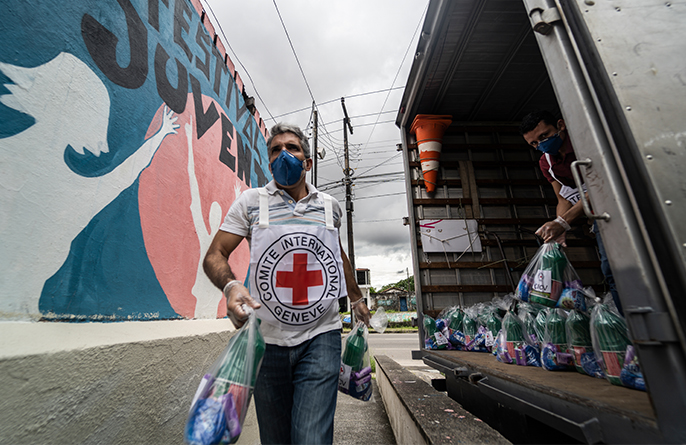Community engagement Driving social progress
ABB actively supports the communities in which our people live and work
ABB has a long and distinguished tradition of serving the community. Our approach is to combine strategic corporate partnerships with country-level projects to address local needs. Our company’s and employees’ contributions make a real difference in people’s lives and we are proud of our employees for donating both time and money to help others in need.
By design, our initiatives aim to provide assistance for the most vulnerable and help sustain progress in the fields of education, diversity & inclusion, and care in the community.
Among our largest programs, we have a corporate-level agreement with the International Committee of the Red Cross (ICRC) to support innovative water and habitat projects, while the Jürgen Dormann Foundation assists financially disadvantaged engineering students. We are also members of the select group of Nobel International Partners.
Our assistance for local and international educational institutions and programs provides students with better learning opportunities, raises ABB’s profile, and helps us to recruit qualified engineers and other staff. Our support for healthcare and diversity & inclusion can deliver positive social and economic benefits to our employees, customers, suppliers and the communities in which we are present, among other major stakeholders. Supporting impactful, community-building projects demonstrates our values and helps secure promote social progress.
Making a difference in 2020
In 2020, ABB contributed to more than 340 community projects and charities worldwide. Out of the 67 countries that report on their social activities, 53 countries hosted ABB operations that engaged in community-level projects. We are particularly proud of our employees and our Business Areas; together, they donated some $10.1 million and bravely provided about 2,000 person-days in volunteer work under extremely challenging circumstances.
While restrictions related to the COVID-19 pandemic limited our ability to implement many projects and activities, we carried out many new activities in response to the unfolding crisis. In addition to implementing measures to protect the health and safety of our own employees and contractors at ABB sites around the world, we launched a range of new initiatives to help our employees, their families and our contractors get through this challenging year.
In countries around the world, local ABB managers assessed the specific needs of their employees before taking action; many of their measures focused on helping employees cope with challenges associated with remote working. A wide range of on-line courses was provided to help employees adapt to working from home; topics included stress prevention and management, ergonomics for home offices, refreshers on time management, and practical home schooling strategies.
We also provided our employees with supplementary health services in areas where local health providers were overwhelmed or access was limited. In the Americas, a number of our local operations offered telemedicine programs to ABB employees and their families. And in countries across the world, our operations worked to equip employees and their families with masks and hand sanitizer.
Particularly during the opening stages of the pandemic, our company mobilized to support hospitals, healthcare workers and first responders, among others. We directly procured and donated tens of thousands of protective masks along with supplies of hand sanitizer and other critical medical supplies. Together with our employees, ABB made direct contributions to hospital or community relief. Our employees also took the initiative by, for example, applying their technical skills to the design and manufacture of goggles and face shields for paramedics, nurses and doctors. Notably, we leveraged ABB’s unique domain expertise to help customers repurpose assembly lines for the manufacture of ventilators; our company also provided emergency response services for hospitals to ensure their electrical systems stayed online.
To address the pandemic’s many secondary effects, we have reached out to help the most vulnerable. Our company and our people donated money and food to foodbanks in Egypt, Spain, United Arab Emirates, and the United States, among other countries. In Brazil, we gave the non-perishable items from our canteen to restaurants serving affordable meals to underprivileged communities. In India, we delivered packages of essential food supplies to over 22,000 children and their families. And in a number of countries, local ABB operations donated personal computers and laptops to schools so that disadvantaged students could attend remote classes during school shutdowns.
Where possible, we upheld our educational commitments to promote STEM education and careers, particularly for girls and women. ABB’s scholarships and mentoring programs continued in China, Hungary, India, Poland and Sweden, among other countries; given the situation, most of these interactions took place online. These academic programs also aim to enhance the employability of students by helping them develop their “soft skills” and giving them practical experience in real industrial environments.
In 2020, ABB in the U.S. established a new collaboration with the National Urban League to support education and promote diversity and inclusion. An ABB Foundation grant will support Project Ready Mentor, the League’s signature education program. Project Ready Mentor equips African-American and other historically underserved youth with the tools they need to succeed at college and in their professional career.
In Italy, ABB continued its 15-year association with Junior Achievement Italia to mentor the young people participating in its entrepreneurial education program, Enterprise in Action. As part of this program, classes set up mini-enterprises for training purposes, developing project ideas from initial concept to launching the enterprise on the market. Thanks to investments in digital technologies and processes, the classes and their volunteer “dream coaches” proceeded without interruption during the pandemic, even in the most heavily affected areas, such as around Bergamo.
Across the world, we made donations or provided services and other forms of support to health initiatives and services. For example, in India mobile health units funded by ABB gave advice and medicine to treat chronic illnesses in the poor and the elderly in rural areas with restricted access to regular healthcare. And in New Zealand, ABB provided electric-vehicle chargers to Asthma NZ’s offices as well as to the homes of its nurses so that the organization could begin switching its fleet over to EVs.
Major initiatives
During 2020, we significantly reinforced two of our existing partnerships – with the International Committee of the Red Cross (ICRC) and with the World Childhood Foundation.
ABB has a longstanding relationship with the ICRC as a founding member of its Corporate Support Group. As part of numerous initiatives within the company to support COVID-19 relief efforts, we undertook a joint initiative with the ICRC to directly assist the world’s most vulnerable people in the fight against COVID-19. ABB made an initial contribution of CHF 1 million and matched contributions from employees in 72 countries to provide a total donation of CHF 2 million. The money raised helped to provide infrastructure for healthcare centers, sanitation infrastructure, and crucial items such as soap and masks in countries such as Nigeria and South Sudan.
As part of our efforts to promote social progress, in 2020 we renewed our partnership with the World Childhood Foundation, a global children’s rights organization that focuses on preventive actions so kids can enjoy a safe childhood. ABB provided CHF 1 million to support the charity during times when many children across the world are particularly at risk as a result of the COVID-19 pandemic.
ABB and the World Childhood Foundation have a longstanding and trusted partnership that started more than 20 years ago, when the company became one of the founding partners of the organization. Established by H.M. Queen Silvia of Sweden, the mission of the foundation is to defend the rights of children and to promote better living conditions for vulnerable and exploited children at risk all over the world. The foundation presently supports more than 75 projects in 14 countries, focusing on prevention, intervention and education efforts.
During the year, ABB also announced it would support the inaugural Ashesi-ETH Master’s in Engineering Program in partnership with two of the world's leading universities for technology and the natural sciences, ETH Zurich in Switzerland and Ashesi University in Accra, Ghana. The program, which is for African undergraduate students with an engineering background, will provide them with a modern, interdisciplinary engineering education over six semesters. Students admitted to the program will receive a scholarship that covers their living expenses and tuition fees; they will also be required to complete an industrial internship with a partner such as ABB. Upon completion of the three-year program, graduates will receive degrees from both ETH Zurich and Ashesi University.
Internally, our two most important initiatives in 2020 were to update the focus areas for our community engagement activities and begin a comprehensive review of our community engagement strategy. We carried out these initiatives in response to the rollout of the ABB Way, our company’s new operating model, and ABB’s newly described Purpose and values.
Based on our successful, existing activities, the interests of our Business Areas and the views expressed by our stakeholders, we will now focus our activities and partnerships on three core areas, which are thematically linked to ABB’s values:
- Education (curiosity): Supporting STEM education, lifelong learning, job readiness and preparedness for digitalization
- Diversity & inclusion (courage): Contributing to employability and diversity in communities and at ABB
- Care for communities (care): Caring for the most vulnerable through disaster relief, health & well-being promotion
In alignment with our fourth value (collaboration), we will work to create value through shared purpose, partnerships and business-driven programs. Our updated community engagement strategy will be developed following further research and consultation during 2021.
Lessons learned
During the implementation of our sustainability strategy 2020, we learned that our community service projects enjoyed the most success when they were based on clearly identified needs and supported by a core group of passionate ABB employees who worked to bring the project to life. When projects are driven by enthusiasm and provide demonstrable benefit to communities, success often snowballs into wider employee support and new project ideas.
We also learned the value of demonstrating the impact of our programs and initiatives. Given that our community engagement projects typically yield results that are difficult if not impossible to quantify, we have learned the importance of communicating the impact of our work through powerful images and stories that illustrate the difference our efforts are having on the people and communities we partner with to achieve shared goals.
Over the past seven years, it has become clear not only that ABB’s employees would like more volunteer options but also that we need to communicate more clearly about the options we already provide. Our people are proud to work for a company that lives its values and cares for their community, and they welcome the opportunity to volunteer their support. In the coming years, we will make a concerted effort to provide employees with more options for and information about volunteering for our various community service projects.
Relatedly, we have noticed that while a local focus can be critical to the success of engagement projects, our people have a deep interest in knowing how their efforts fit into a larger story. Quite often, our employees and local business managers prefer their contributions to be a part of a wider corporate or Business Area effort; they want to experience a strong sense of solidarity and to see the potential global impact of their efforts. This is a critical insight, one that is also related to the challenges of measuring and assessing the impact of community-level projects.
We will take these lessons learned into full account as we work to further develop our Group-wide and business-specific programs for the upcoming 2030 sustainability reporting cycle.

